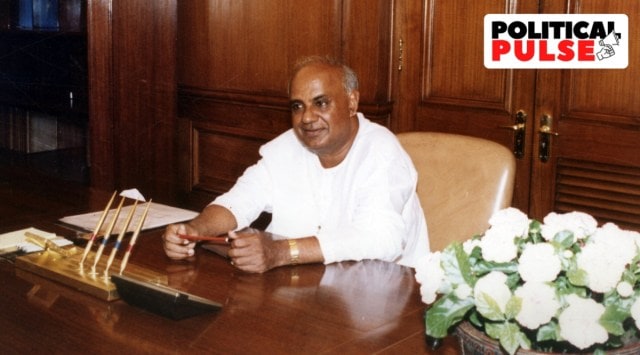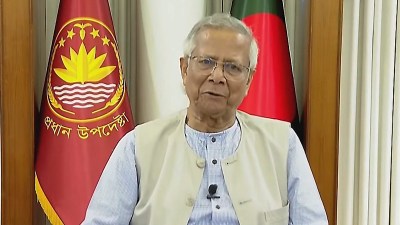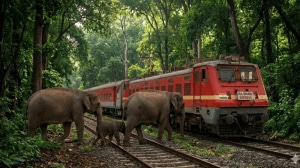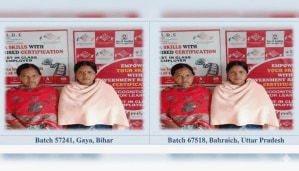Long before his govt’s Bill failed in LS, Deve Gowda took measures to boost women representation in state
After the Narasimha Rao govt reserved a third of the seats in local bodies for women in 1992, Karnataka was the first state to implement it. Then, as CM from 1994 to 1996, Deve Gowda ordered 33% reservation for women in govt jobs, and then 50% quota for them in jobs in educational bodies and panchayat bodies
 Former prime minister and Janata Dal (Secular) president H D Deve Gowda. (Express Archive)
Former prime minister and Janata Dal (Secular) president H D Deve Gowda. (Express Archive) “WHO GAVE you reservations in taluk, zila and gram panchayats?… Please speak the truth. We have lived our lives truthfully, and will die the same way,” former prime minister and Janata Dal (Secular) president H D Deve Gowda said to women at a rally at Tumkur in April ahead of the 2023 Karnataka Assembly elections.
Considered among the pioneers of reservation for women in Karnataka and the country, the issue of women’s representation has been a constant feature of the politics of Deve Gowda, on account of his role in introducing reservation as Karnataka Chief Minister in the mid-1990s and tabling the first women’s reservation Bill as the PM in 1996.
When the JD(S) backed the candidature of Droupadi Murmu for the post of the President of India last year, despite being opposed to the BJP at the time, Deve Gowda’s history of supporting political representation for women was cited among the reasons.
At election rallies, Deve Gowda has often cited the “failure” of the BJP and Congress on this, saying they did not support reservation for women when a Bill was tabled in 1996 under his Janata Dal-led United Front government.
After the 73rd Amendment of the Constitution in 1992, passed by the P V Narasimha Rao-led Congress government, facilitated the creation of the panchayati raj system and reserved a third of the seats in local bodies for women, Karnataka had been the first state to implement it by passing the Karnataka Panchayat Raj Act, 1993.
Then, when Deve Gowda was the state’s CM from 1994 to 1996, the Karnataka government passed an executive order to provide 33% reservation for women in government jobs and followed it up with orders for 50% reservation for women in jobs at educational institutions and elected panchayat bodies in the state.
“As CM, Deve Gowda looked at gender justice too. He perhaps wanted to shape it as an autonomous political constituency in Karnataka, where rules that usually defined caste identity politics would not apply,” author and journalist Sugata Srinivasaraju writes in Furrows in a Field, a biography of Deve Gowda.
He further writes that Deve Gowda wrote to Narasimha Rao, who was PM at the time, “to bring a Constitutional amendment to provide reservation for women in the state Assemblies and Parliament”, and sent a delegation to meet political leaders “to canvass support for this agenda”.
“The fact that Deve Gowda attempted this progressive measure, in such a decisive manner, never got spoken about for two reasons. One, Gowda did not know how to arrange communication or publicity around it, a deficiency of his political life. Two, he did not speak the language of Anglophone liberals or ideologues when he did this,” the author says.
When chosen to be the PM of the United Front government in 1996, Deve Gowda continued the efforts he initiated during his days as the Karnataka CM for greater representation of women in politics. “Within three months of being sworn in, on August 28, 1996, he ensured that the Cabinet discussed the Women’s Reservation Bill. It was therefore introduced in the Lok Sabha as the 81st Constitutional Amendment Bill on September 9, 1996. But discussions on it were blocked on technical grounds,” says Srinivasaraju. The Bill was referred to a Joint Parliamentary Committee, which presented its report in December 1996.
Less than a year into Deve Gowda’s term, the United Front government fell to infighting and the Bill lapsed.
The decision by the Narendra Modi-led BJP government to revisit the women’s reservation Bill, nearly 27 years after it was first tabled, was welcomed on Tuesday by Deve Gowda’s son and former CM H D Kumaraswamy. The Bill has come at a time when the JD(S) is drawing closer to the BJP on account of cordial ties between Modi and Deve Gowda.
“When H D Deve Gowda was the Prime Minister… this historic Bill was tabled in the Rajya Sabha but certain allies in the United Front government opposed the Bill and it was not passed. Some of the leaders who are a part of the Congress-led INDIA alliance were responsible for blocking the Bill at the time,” Kumaraswamy said on social media.
“In 1995, when Deve Gowda was the Karnataka CM, he provided reservations for women in elected local bodies, gave them the right to exercise power and contributed to the empowerment and equality of women. The whole country had watched this development closely at the time,” Kumaraswamy said.
“The passage of the Bill for providing reservation to women in the Lok Sabha is definite. This will realise the dream of the former PM Deve Gowda. It is the need of the hour to provide equality to women. The decision by PM Modi and his Cabinet is commendable. My request is that all parties, irrespective of their political standing, must support this Bill,” he said.
- 01
- 02
- 03
- 04
- 05































